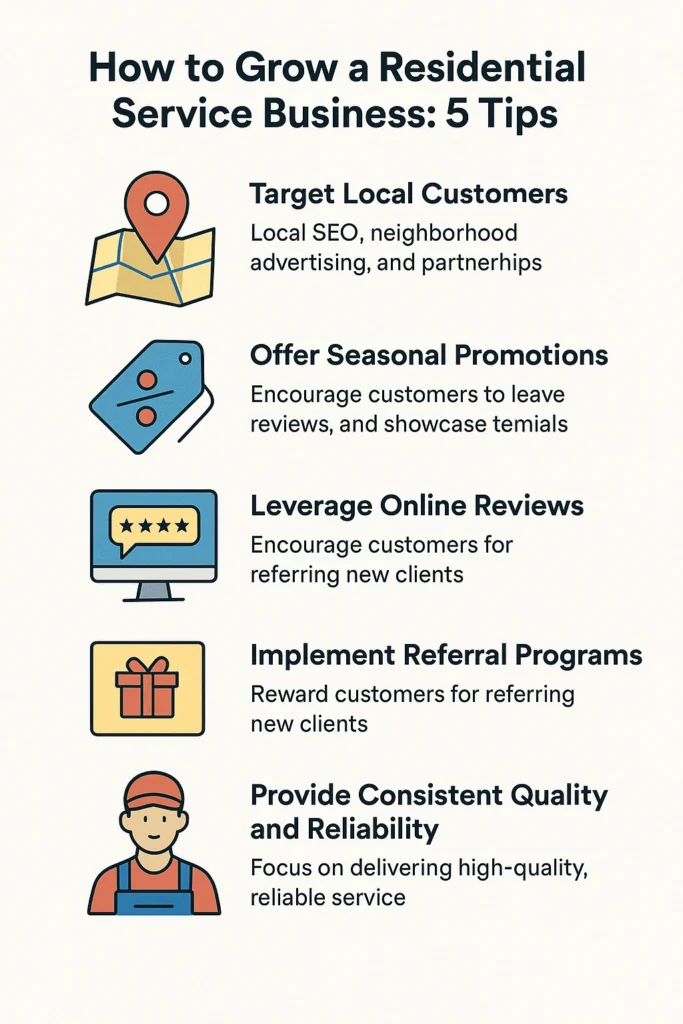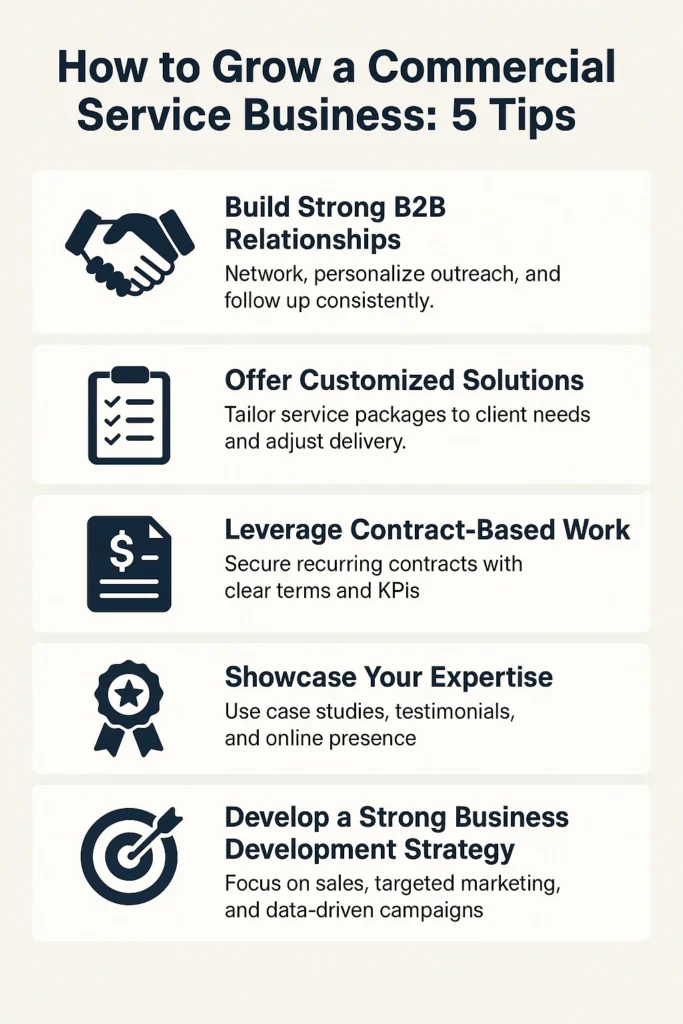Growing a service business comes with unique challenges and opportunities. Unlike product-based companies, service businesses rely heavily on relationships, trust, and consistent quality to attract and retain clients.
In this guide, we’ve gathered 25 expert tips designed to help you expand your client base, improve operations, and increase revenue, all while maintaining the high-quality service your customers expect. These actionable insights will give you the tools to take your business to the next level.
Key Takeaways
- Understand your target market and tailor your services to their needs to attract the right clients.
- Exceptional customer service and consistent quality turn one-time clients into loyal, long-term customers.
- Leveraging technology and tools like DepositFix can streamline operations and improve cash flow.
- Building strong relationships and strategic partnerships drives referrals, repeat business, and growth.
- Continuous monitoring, training, and adaptation ensures your service business stays competitive and scalable.
How to Grow a Service Business: 15 Tips
Growing a service business requires a mix of strategy, customer focus, and operational efficiency. These 15 practical tips provide actionable steps to attract more clients, improve service quality, and boost revenue.
Understand Your Target Market
Understanding your target market isn’t just about demographics, it’s about deeply knowing what drives your clients’ decisions. Create detailed buyer personas, including: age, income, location, lifestyle, values, and service expectations. Gather insights through surveys, social media polls, client interviews, and analytics tools like Google Analytics or Facebook Audience Insights.
For example, a residential plumbing service might discover that busy professionals prioritize emergency availability and transparent pricing, while commercial property managers care more about certifications, compliance, and long-term contracts. Tailoring your messaging, services, and marketing campaigns to these insights ensures that you attract the right clients efficiently.
Offer Exceptional Customer Service
Service quality alone isn’t enough; client experience is what sets you apart. Exceptional service includes responsiveness, personalization, and follow-up. Train your team to anticipate client needs and solve problems proactively.
For example, a landscaping company could schedule seasonal visits to inspect client properties, sending personalized recommendations or reminders for tree trimming, fertilization, or pest control. Simple touches like handwritten thank-you notes, birthday messages, or small loyalty rewards can turn one-time clients into long-term ambassadors.
Leverage Referrals
Referrals are gold in the service industry because they come with built-in trust. Develop a structured referral program with clear incentives. This could be:
- Discounts on future services
- Gift cards
- Free service add-ons
For example, a residential cleaning service might offer a free deep-cleaning session after a client successfully refers three neighbors. Make the referral process simple: provide clients with easy-to-share links, business cards, or social media prompts. Tracking referrals also allows you to reward top advocates and refine your program over time.
Build a Strong Online Presence
A strong online presence builds credibility and expands reach. Start with a professional, mobile-friendly website with clear calls to action. Include:
- Service descriptions
- Client testimonials
- Before-and-after photos or videos
- Frequently Asked Questions (FAQ)
Social media platforms like Instagram, Facebook, LinkedIn, and TikTok can showcase your expertise. Example: A commercial cleaning company could post short video demonstrations of sanitized office spaces or time-lapse videos of large-scale cleanups, paired with client testimonials. Encourage clients to leave reviews on Google, Yelp, and industry-specific platforms.
Invest in Branding
Branding is more than logos or colors, it’s how clients perceive your business. Consistency in messaging, visuals, and tone builds trust and memorability. Every interaction should reflect your brand values: from your website and social media to staff uniforms, service vehicles, and invoices.
Example: A home renovation business could use branded signage on worksites, professional uniforms, and a cohesive social media theme, creating a sense of professionalism that differentiates it from competitors. Over time, strong branding can justify premium pricing.
Diversify Your Services
Diversifying services can increase revenue and stabilize cash flow. Look for complementary offerings that match client needs or fill gaps in the market.
Example: A plumbing company could add water filtration system installation or emergency leak detection.
Diversification also helps mitigate seasonal fluctuations. For instance, a landscaping company could offer snow removal in winter to maintain revenue year-round.
Network Strategically
Strategic networking opens doors to long-term contracts and partnerships. Attend trade shows, local business events, and professional associations. Build relationships with decision-makers such as property managers, business owners, or industry influencers.
Example: A commercial HVAC company might attend local property management association meetings to connect with office building managers who require ongoing maintenance contracts. Networking also allows knowledge sharing and collaborations that can enhance your service offerings.
Implement Efficient Processes
Efficiency drives profitability and client satisfaction. Streamline workflows with technology, standardized procedures, and automation. Examples:
- Scheduling software to optimize staff routes and reduce travel time
- Automated invoicing to accelerate payment cycles
- Checklists and SOPs to ensure consistent service quality
When you reduce administrative burdens, your team can focus on delivering exceptional service, while clients benefit from faster, more reliable experiences.
Offer Packages or Memberships
Service packages and memberships simplify decision-making for clients while generating predictable revenue. Examples:
- Seasonal landscaping packages including mowing, fertilization, and pruning
- Maintenance contracts for commercial HVAC or plumbing systems
- Tiered service memberships with priority scheduling and discounts
Bundling services encourages clients to commit to more than a one-time purchase, creating loyalty and a recurring income stream.
Invest in Staff Training
Your employees are the face of your business, and investing in their development pays dividends. Training should cover:
- Technical skills relevant to your services
- Customer service excellence
- Safety and compliance updates
Example: A commercial cleaning company might train staff in new disinfection protocols to attract health-conscious clients. Skilled, knowledgeable staff deliver higher quality service, increase client satisfaction, and strengthen your reputation.
Use Client Feedback
Actively collecting and acting on feedback improves your service and strengthens client trust. Use surveys, review requests, and post-service follow-ups to gather insights.
Example: A residential painting company might adjust scheduling or communication methods based on client suggestions, ensuring smoother project experiences. Publicly acknowledging feedback, especially negative reviews, demonstrates accountability and reinforces trust with potential clients.
Leverage Digital Marketing
Digital marketing amplifies your reach and positions your business as an authority. Some of the strategies include:
- SEO for local searches (“best commercial cleaning service near me”)
- Targeted social media advertising by location, age, or industry
- Email marketing to promote seasonal services or special offers
- Content marketing, such as blog posts or video tutorials
Example: A landscaping business could post short videos showing seasonal lawn care tips, positioning itself as a trusted expert while attracting organic leads.
Monitor Competitors
Competitive intelligence helps you identify gaps and opportunities. Study competitors’ offerings, pricing, client engagement, and marketing strategies. Ask yourself: What are they doing well? Where are they lacking? How can we differentiate ourselves?
Example: If competitors respond slowly to inquiries, you can position your business as highly responsive, offering live chat, same-day callbacks, or fast scheduling. Differentiation creates a competitive edge that attracts clients looking for better service.
Track Key Metrics
Track client acquisition cost, retention rate, revenue per client, and customer satisfaction scores. These indicators highlight growth opportunities and areas needing improvement.
Example: If analysis shows that repeat clients generate the highest profit margins, you could invest in loyalty programs or subscription-based services rather than focusing solely on new client acquisition.
Focus on Relationship Building
Strong relationships lead to loyalty, repeat business, and referrals. Communicate regularly, personalize interactions, and show genuine care for clients’ needs.
Example: A landscaping company could send seasonal greetings, helpful maintenance tips, or small client appreciation gifts. These gestures create an emotional connection, keep your business top-of-mind, and foster long-term client loyalty.
How to Grow a Residential Service Business: 5 Tips
Residential service businesses thrive on local visibility, strong client relationships, and consistent, high-quality service. The following 5 tips offer practical strategies to attract homeowners, increase repeat business, and build a trusted local reputation.
Target Local Customers
For residential service businesses, most of your clients will come from your immediate community. Focus on strategies that make your business highly visible to local homeowners:
- Local SEO: Optimize your website and Google Business Profile so that your business appears in searches like “plumber near me” or “landscaping services in [city].”
- Neighborhood Advertising: Use direct mail, local newspapers, or flyers in community centers to reach nearby homeowners.
- Partnerships: Collaborate with local businesses such as real estate agencies, hardware stores, or home improvement centers to generate referrals.
Example: A lawn care company could partner with a local garden center to offer discounts to customers who purchase plants and sign up for lawn services, creating a win-win partnership.
Offer Seasonal Promotions
Homeowners often need different services depending on the season. Offering seasonal promotions not only attracts new clients but also encourages repeat business:
- Offer winter heating system inspections, spring gutter cleaning, or summer lawn fertilization packages.
- Create limited-time offers to create urgency, such as “Book your spring lawn aeration before March 31 and get 10% off.”
- Bundle services together for convenience, like combining window cleaning with power washing.
Example: A residential painting company could run a “Pre-Summer Refresh” promotion, offering a discounted rate for exterior painting booked between April and June.
Leverage Online Reviews
Positive online reviews are a powerful trust signal for homeowners searching for local services. Encourage reviews strategically:
- After completing a service, send a personalized follow-up email asking for feedback and a review.
- Offer small incentives like discount codes for future services (without violating platform rules).
- Showcase testimonials on your website and social media to increase credibility.
Example: A cleaning service could highlight client reviews in weekly social media posts, such as “Thanks to Sarah from [Neighborhood] for leaving us this 5-star review!” This builds social proof and reassures potential clients.
Implement Referral Programs
Word-of-mouth is especially effective in residential markets. Reward your loyal clients for spreading the word:
- Offer discounts, free services, or gift cards for successful referrals.
- Make the process simple: provide clients with referral cards, email links, or social media posts they can easily share.
- Track referrals to identify your best advocates and reward them consistently.
Example: A plumbing company could offer $25 off a client’s next service for every neighbor they refer, while giving the new client a small welcome discount. This creates an incentive for both parties to participate.
Provide Consistent Quality and Reliability
Residential clients value dependability and consistency over everything else. Building a reputation for high-quality, reliable service ensures long-term client retention:
- Show up on time and complete work as promised.
- Maintain professional behavior and communication with clients.
- Regularly train your team to ensure service standards are met consistently.
Example: A home HVAC company could provide clients with reminders for annual maintenance and guarantee appointments within a specific time window. Delivering dependable, quality service fosters loyalty, repeat business, and referrals.

How to Grow a Commercial Service Business: 5 Tips
Commercial service businesses succeed with building strong B2B relationships, delivering customized solutions, and maintaining operational excellence. The following 5 tips provide actionable ways to secure contracts, improve client satisfaction, and scale your commercial services effectively.
Build Strong B2B Relationships
Relationships are the lifeblood of commercial service businesses. Focus on building trust and credibility with decision-makers, property managers, business owners, and procurement officers. Approach networking as a long-term investment:
- Attend industry events: Trade shows, conferences, and chamber of commerce events are excellent places to meet potential clients.
- Personalized outreach: Send tailored emails, LinkedIn messages, or proposals that address specific client challenges.
- Follow up consistently: Keep in touch regularly without being pushy, sharing updates, helpful insights, or case studies relevant to their business.
Example: A commercial HVAC company might attend property management events, introduce their maintenance programs, and follow up with property managers offering free system evaluations, building credibility and trust.
Offer Customized Solutions
Commercial clients have diverse needs depending on their industry, size, and operations. Standardized services rarely meet complex commercial requirements.
- Assess client needs: Conduct on-site consultations to understand their specific challenges and goals.
- Create tailored proposals: Offer service packages that address their unique operational requirements.
- Adjust service delivery: Be willing to modify schedules, service frequency, or staffing to fit client preferences.
Example: A commercial cleaning company could design different solutions for office buildings, medical clinics, and warehouses, adjusting cleaning frequency, specialized equipment, or disinfection protocols according to each client’s requirements.
Leverage Contract-Based Work
Contracts and service agreements provide predictable income, minimize downtime, and build client loyalty:
- Offer tiered service agreements: Basic, standard, and premium packages help clients choose a plan that fits their budget and needs.
- Emphasize recurring maintenance: Highlight the benefits of preventive maintenance for reducing emergency costs and improving operational efficiency.
- Include clear terms and KPIs: Ensure contracts define expectations, deliverables, and timelines to prevent misunderstandings.
Example: A commercial landscaping company could secure annual maintenance contracts with office complexes, providing regular lawn care, seasonal planting, and snow removal, ensuring steady cash flow year-round.
Showcase Your Expertise
Demonstrating expertise builds credibility, attracts larger clients, and differentiates your business from competitors:
- Use case studies: Highlight past projects, challenges solved, and measurable results.
- Collect testimonials: Feature client endorsements on your website and social media.
- Maintain a professional online presence: A polished website, LinkedIn profile, and content marketing position your company as an industry leader.
Example: A commercial security company could publish a case study detailing how they reduced theft and increased employee safety for a corporate client, supported by quotes and metrics, demonstrating real-world value to potential clients.
Develop a Strong Business Development Strategy
A strong sales and marketing strategy will help you reach the right commercial clients and convert leads into contracts:
- Dedicated sales team: Hire or train staff to specialize in B2B sales, understanding the procurement process and client pain points.
- Targeted marketing: Use LinkedIn, industry newsletters, and local business directories to reach decision-makers.
- Data-driven campaigns: Track lead sources, engagement metrics, and conversion rates to refine strategies.
Example: A commercial IT services firm could run LinkedIn campaigns targeting CTOs of medium-sized businesses, combining informative whitepapers with a follow-up sales call from a dedicated account manager, increasing the chances of landing long-term contracts.

Grow Your Service Business with Natalie Luneva and DepositFix
Growing a service business requires both strategic guidance and efficient tools. Natalie Luneva provides expert mentorship and actionable growth strategies, while DepositFix streamlines your payment processes, helping you save time, reduce errors, and improve client satisfaction. Together, they empower service businesses to scale effectively and operate more efficiently.
Natalie Luneva: Empowering Service Business Owners
With over a decade of experience in marketing and operations, Natalie Luneva specializes in helping blue-collar service business owners unlock growth through:
- Community-Led Growth: Building engaged communities around your brand to foster loyalty and word-of-mouth referrals.
- High ROI Strategies: Identifying and implementing marketing and operational strategies that yield the highest returns.
- Team Performance Optimization: Enhancing team dynamics and performance to drive business success.
- Personalized Coaching: Offering tailored mentorship to address specific business challenges and opportunities.
When partnering with Natalie, service business owners can gain clarity, implement effective growth strategies, and build high-performance teams.
DepositFix: Streamlining Payments for Service Businesses
DepositFix is a specialized payment solution designed to simplify and automate payment processes for service-based businesses. Key features include:
- Customizable Payment Forms: Create branded payment forms that collect necessary customer information.
- Integrated Payments: Seamlessly integrates with ERP and CRM platforms for efficient payment management.
- Multiple Payment Methods: Supports various payment options like credit cards, ACH, and PayPal.
- Recurring Billing: Automates subscription billing, reducing manual workload.
- Automated Invoicing: Generates and sends invoices automatically, improving cash flow.
- Client Portal: Provides a portal for clients to manage their payments and billing information.
With DepositFix, service businesses can reduce administrative tasks, minimize errors, and enhance customer satisfaction through streamlined payment processes.
With Natalie Luneva’s strategic guidance and DepositFix’s efficient payment solutions, service businesses can achieve sustainable growth and operational excellence. Book your free strategic call and see how you can scale your service business.
Conclusion
Growing a service business successfully requires a combination of strategic planning, consistent execution, and efficient tools. When you apply the 25 expert tips outlined in this guide, you can attract the right clients, optimize operations, and build lasting relationships that drive revenue. Whether you focus on residential or commercial services, investing in customer experience, team development, and smart technology will ensure long-term growth.
Partnering with experts like Natalie Luneva and leveraging tools like DepositFix can further accelerate your progress, helping you streamline processes, improve cash flow, and scale your business with confidence. Ultimately, success comes from balancing high-quality service with smart business strategies, turning challenges into opportunities for sustainable expansion.
FAQs
What is the best way to price services for a new service business?
Pricing should balance competitiveness with profitability. Research local competitors, calculating your costs, and factoring in overhead and desired profit margins. Consider offering introductory rates or bundled packages to attract initial clients while demonstrating value.
Should I specialize in one service or offer multiple services?
Specialization can help you become an expert in a niche, attracting clients seeking specific solutions. Offering multiple services can increase revenue and provide recurring opportunities. Analyze market demand and client needs to determine the right balance.
What are the most common mistakes new service businesses make?
Common mistakes include underpricing services, neglecting marketing, ignoring client feedback, failing to track key metrics, and overextending without proper operational systems in place. Awareness and proactive planning help avoid these pitfalls.
What operational processes are critical for scaling a service business?
Key processes include standardized workflows, automated invoicing, consistent quality checks, inventory management (if applicable), and client communication protocols. Documenting these processes ensures consistency as your team grows.
How can I manage recurring service contracts efficiently?
Use contract management or invoicing tools that automate billing, reminders, and renewals. DepositFix, for instance, can handle recurring payments and client portals, reducing manual administration and improving cash flow reliability.
How can automation reduce operational costs?
Automation minimizes repetitive tasks such as invoicing, appointment reminders, follow-up emails, and reporting. This reduces labor hours, human errors, and ensures timely operations while freeing staff to focus on client-facing work.


